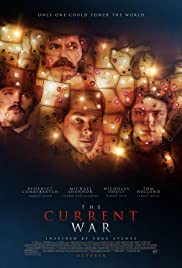
THE CURRENT WAR
US, 2017, 102 minutes, Colour.
Benedict Cumberbatch, Michael Shannon, Nicholas Hoult, Tom Holland, Matthew McFadyen?, Katherine Waterston, Tuppence Middleton.
Directed by Alfonso Gomez- Rejon,
Electricity. Electric current.
Electricity, inventions, applications, was one of the key elements of progress in the 19th century, especially in the United States. America eventually lit up the world. However, the development of electricity and its current, direct current, alternating current, was not a straightforward event. As this story indicates, there was a current war.
And the antagonists were the genius of Menlo Park, the multi-talented inventor, Thomas Edison. And, rivalry with an East Coast inventor, entrepreneur, George Westinghouse. The two men were not friends. There was an intense rivalry – and some tactics of warfare. But, into the picture comes the migrant from Europe, Nikola Tesla, intelligent, visionary, wanting a job, working for Edison for some time, disagreeing with him, fired, setting up on his own, engaging with Westinghouse, but finally being ousted from the pantheon of inventors. A number of viewers were very angry with this film feeling that it also ousted Tesla – although, it actually does tell the story of the migrant inventor, his talent, his experiences with both Edison and Westinghouse, and acknowledges that his abilities were not appreciated in his lifetime, and his dying in poverty.
The film had difficulties in its distribution, being part of the Weinstein company’s distribution and falling foul of the Harvey Weinstein scandals. It was released, withdrawn, edited it, a Director’s cut released in 2019.
In fact, cut is an apt word. The style and structure of the film involves a great number of cuts, editorial cuts, pieces of the drama, focusing on each of the protagonists, moving swiftly on to another, something of mosaic rather than an extended drama. While the screenplay covers the current war, it might have been more dramatically effective by concentrating on one, then on the other, building up the drama rather than being so episodic.
This is a Benedict Cumberbatch film. He portrays Edison as an intense man, not the easiest in terms of social relations, even in family, driven by his genius, the enormous range of his inventions, his desire for the patents and protecting his work, irrespective of money, grand plans, needing support of finances like JP Morgan (Matthew Mc Fadyen). We see him with his plan for illuminating a square mile in New York City.
In the meantime, there is his rival, George Westinghouse, played by Michael Shannon, a more sympathetic role than many of his dark characters and on-screen villains. He has an alternate theory about electricity, alternating current. Edison scoffs at this, even using/misusing a media campaign highlighting potential dangers of death by touch, especially as the method of alternating current is to be used in New York state prisons for the electric chair. Westinghouse is branded as a murderer. Yet Edison himself succumbs, although not wanting any of his inventions to harm human beings, to witness the electrocution of a horse and then to provide secret advice to the authorities about the effect of electric chair (his letters to be burnt, their being kept, stolen by Westinghouse and released to the media – warfare).
So, a portrait of each of the inventors, their rivalries, their bids for illuminating the 1893 Chicago World Fair, and dramatic encounter between the two at the fair. And, the subplot of Tesla, played by Nicolas Hoult, his ambitions, his visions, his failures.
While this film is interesting, there is room for further drama about these characters and their rivalries.
1. The title? Electric current? Inventions of the 19th century? In the United States? Edison, Westinghouse, Tesla?
2. The troubled release of the film, editing?
3. The structure of the film, the introduction to each character, his work, his background, a mosaic of short sequences illustrating each character, the situation with electricity, JP Morgan and business interests, rivalry, personal antipathy?
4. The portrait of Thomas Edison, his status in American history, as an inventor, the genius of Menlo Park, the range of inventions, the patents, the ambiguity of money, his being in need, yet protective of his inventions? Electricity? Current? The lightbulbs? Generation of electricity? The development of his current? Lighting the section of New York City, the appeal to the authorities, to Morgan, his staff, the developments? Tesla coming to work for him, his attitude, payment, disagreements, dismissing him?
5. The portrait of George Westinghouse, his talent, less inventive but distinguished in developing of lighting of cities, alternating current, the contracts, his success, the wide range? The meeting with Tesla, their discussions, collaboration?
6. The issue of the Chicago World Fair, the bids, the theory of current, Edison and his long explanation, Westinghouse and the brevity of his presentation, financial issues, the decision for him? The sequences at the World Fair?
7. The rivalry between the two men, in the media, Edison on the train ignoring Westinghouse, the issue of capital punishment, the use of alternating current, Edison not wanting having anything to do with electricity killing humans? The experiment with the horse and its death? The New York government approaching Edison, his agreeing to give advice about the current for the electric chair, the correspondence and his assuming that it was destroyed, its being kept, Westinghouse getting it? Edison and the campaign to indicate that Westinghouse was a killer? The plan backfiring on him?
8. The character of JP Morgan, finance, companies, electricity, the lighting of cities, the clashes with Edison and funding?
9. The background, Westinghouse and his wife and her support and collaboration? Edison, his supportive wife, the family? Edison and his commitment to his work, absences from home?
10. The role Tesla, the migrant, his talent, visionary, the approach to Edison, working for him, alternating current, his leaving, setting up his own company, the issue of finance, his being fired, collaboration with Westinghouse? His sad career, impoverishment?
11. A perspective on American history, the inventiveness of the 19th century?